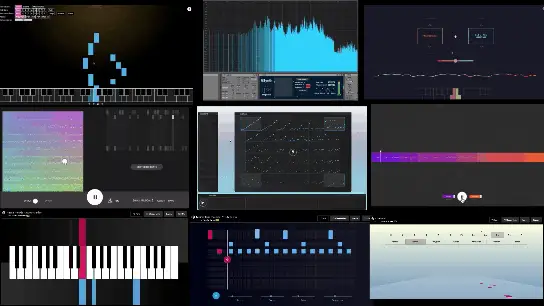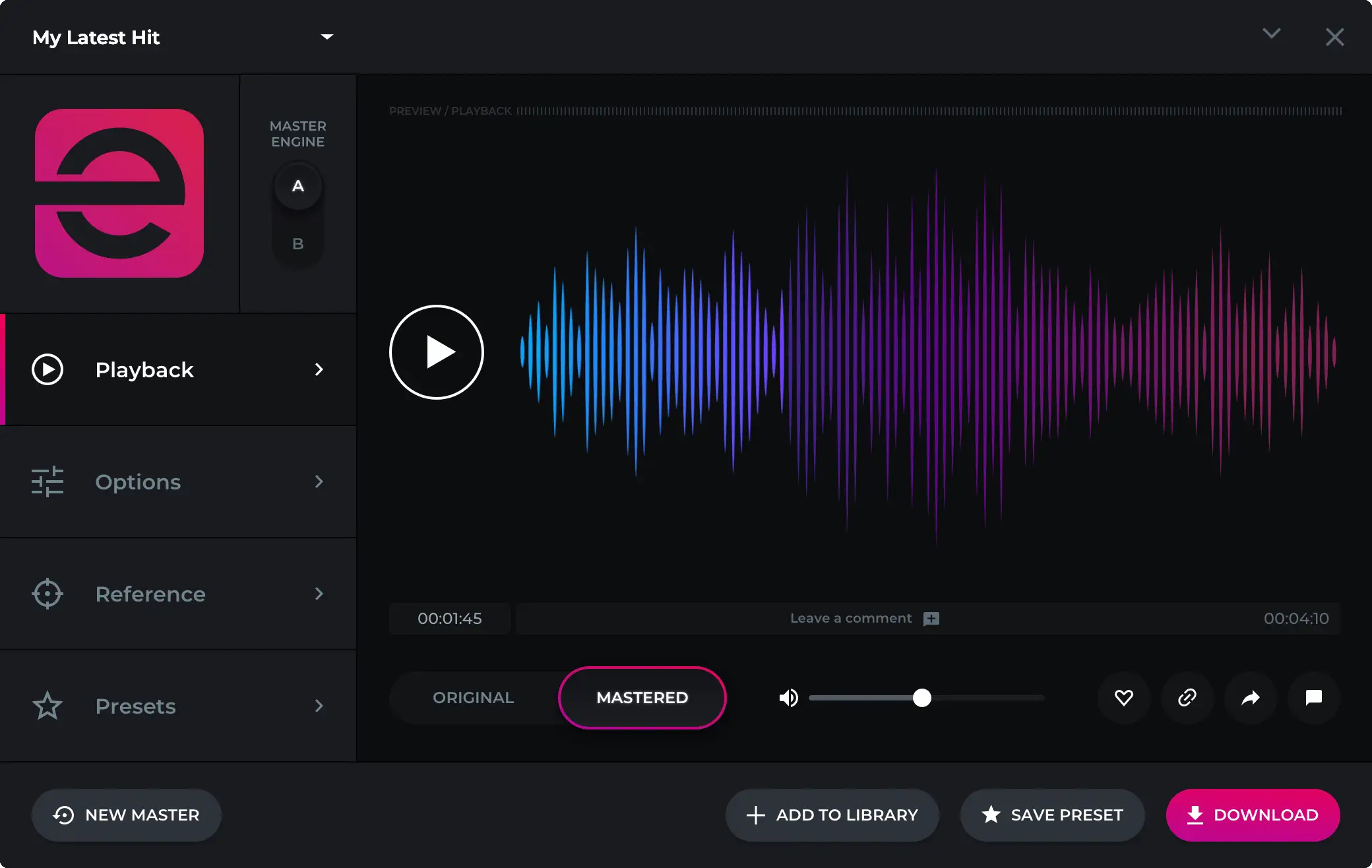Making music is one of the most inherently human activities, rooted deeply in traits we often don't attribute to AI, such as emotion, creativity, and personal expression. However, in recent years, Artificial Intelligence (AI) has come up not only to assist us in the music production process but to take over certain tasks completely.
In fact, AI’s capabilities have become so advanced that even major companies like Sony and Warner Music Group are leveraging this technology through platforms like Endel and Magenta .
From writing lyrics to throwing together trap beats, AI has wormed its way into nearly every aspect of music creation, and now, it's becoming an integral part of the mastering process for many artists and producers.
This raises an intriguing question: will there still be a need for human expertise in mastering, or are we on the brink of AI taking over entirely?
In this guide, we'll explore the rapid rise of AI mastering , its current impact on the industry, and what the future may hold for this technological marvel.
A Short History Of AI In the Music Industry
The music industry is in a constant state of innovation and change. It's continually evolving with new technologies that reshape how music is created, recorded, and consumed. Even before AI became all the rage, there were other technological advancements that seemed just as frightening or confusing to creatives.
If we venture back to 1877, when Thomas Edison invented the phonograph, it was the first time a device was capable of both recording and reproducing sound. When it was introduced, it stirred fears that live performances would become obsolete and that recorded music might undermine the artistry of live musicians.
Then, in the 1930s, the almighty electric guitar revolutionized the sound of music forever. Of course, traditionalists worried that its amplified sound would erode the purity of acoustic instruments and diminish the skill required to play music.
People feared the advent of multi-track recording, as people would be able to artificially manipulate music, the birth of MIDI in the 1980s, as it would lead to a mechanical, less human feel in music, and the explosion of digital audio workstations in the 1990s, as they would make high-quality music production too accessible, flooding the market with amateurish content and devaluing professional studios.
The moral is that this fear is nothing new.
AI began making its mark in music in the early 21st century.

One of the early examples was Google's Magenta, a research project that explored how AI could be used to create music and art. Magenta's AI-generated compositions demonstrated the potential for machine learning to assist in the creative process. IBM's Watson Beat was also made to analyze songs and created new music by trying to understand the emotional intent behind them.
AI algorithms would eventually come about to take on more complex roles, one of which has become exceedingly popular - AI mastering.
What Is The Goal Of Mastering?
Understanding how AI had its rise starts by understanding the reason behind mastering in the first place.
At its most basic, the overall goal of mastering is to make sure a track sounds polished, professional, and balanced, ready for distribution across various platforms and playback systems.
Think of it like the final editing and color grading process in filmmaking. Just as a film editor enhances the visual elements and ensures consistency in tone and quality, a mastering engineer will tweak and fine-tune the given audio to ensure clarity, balance, and cohesion.
Unfortunately, mastering can also be quite expensive due to the expertise required and the high-end equipment used.
Many professional mastering services can range from $50 to $200 per track , and in some cases, even more for highly sought-after engineers. An entire album can cost a few-thousand or more, and if you've already paid for recording, production, and mixing, it can be added salt in the wound.
Of course, we'll be the first to note that the cost is absolutely warranted .
It reflects the years of experience, specialized skills, and state-of-the-art technology involved in the process. For bedroom producers and indie artists working with limited budgets, however, these expenses can be prohibitive, making traditional mastering services less viable for many up-and-coming musicians.
The Evolution of AI Mastering in Recent Years
Over the past decade, automated and artificial intelligence mastering options have emerged, giving artists access to professional-sounding masters without the high costs associated with human mastering engineers.
These AI-driven services offer an attractive alternative for musicians looking to finalize their tracks quickly and affordably.
Some AI mastering platforms use signal chains designed by experienced human engineers over the course of several years, applying tried-and-true techniques to enhance mixes that draw on the expertise embedded in their programming.
On the other hand, some services employ deep learning networks that analyze vast amounts of audio data over time. These networks learn and adapt, continuously improving their mastering capabilities based on the data they process.
The Rise of AI Audio Mastering
Landr was one of the first AI mastering services to hit the market, debuting in 2014.
This pioneering platform was meant to provide artists with an affordable and efficient way to master their tracks using advanced algorithms.
The process is simple: you upload your mix, and Landr's AI analyzes and processes the audio, applying EQ, compression, and other mastering techniques to enhance the track. The result is a polished, professional-sounding master ready for distribution.
However, people quickly became aware that if they weren't entirely satisfied with Landr's output, there was a limitation: you can't ask the AI to tweak the sound in the way you would with a human mastering engineer.
The AI applies a standardized process that may not cater to every artist's unique preferences. Despite this, Landr’s algorithm continuously improves with every song uploaded to the platform, learning and adapting to provide better results over time.

eMastered's AI mastering algorithm hit the public scene shortly after Landr and made a name for itself with a different approach to AI mastering.
Founded by Grammy-award-winning mixing and mastering engineer Smith Carlson and electronic music artist Collin McLoughlin, eMastered combines a deep industry expertise with cutting-edge technology. Unlike Landr, eMastered offers users more control over the final master, allowing adjustments to compressor intensity, EQ settings, volume, and stereo width.
Users can even upload a reference track to guide the mastering process, ensuring the final product aligns with their artistic vision.
Why Are AI Mastering Services So Popular?
There are several reasons AI mastering services are becoming more popular than they ever have been, especially as they continue to evolve into more advanced and accessible tools.
- Free Previews : Many AI mastering services allow you to preview your mastered tracks at no cost, helping you decide if the service meets your expectations before making any financial commitment.
- Cheap, Flexible Pricing : Compared to traditional mastering, AI mastering is generally more affordable.
- Convenient and Efficient : AI algorithms can process tracks in a matter of minutes, offering a far quicker turnaround time than human mastering engineers. Artists can finalize their projects quickly without waiting days or weeks to get any results.
- High Quality Masters : Despite the lower cost and faster processing, today's AI mastering services deliver high-quality, polished tracks that meet commercial music industry standards, ready for release on any platform.
- Creative Control: Services like eMastered offer users extensive control over the mastering process, allowing adjustments to compressor intensity, EQ settings, volume, and stereo width. While you may not be able to make nuanced adjustments like you could with human engineers, this added level of customization makes it easier to ensure the final master aligns with your vision.
- Reference Track Masters : Several AI mastering tools and services allow you to upload or import a reference track to serve as a guide for the mastering algorithm to achieve a sound similar to the reference.
Of course, even with the many benefits of AI tools in mastering, the process is still not a replacement for a skilled mastering engineer, which brings us to what might be the most important question.
Will AI Mastering Take the Jobs of Human Mastering Engineers?
As AI mastering services continue to evolve, many people worry that they will eliminate the need for human engineers. While the concern is warranted, it's nothing unique to music. In fact, it's echoed across various industries where AI is making significant inroads, in fields such as customer service, manufacturing, and even journalism.
Then, we have some musicians who take its rise without a high level of concern.
UK-based mixing and mastering engineer Streaky, once noted that AI mastering can be compared to buying a suit off the rack versus getting a bespoke suit tailored to your exact measurements.
While some people will always prefer the added level of care and customization offered by a human mastering engineer, for many, the cheaper and quicker option provided by AI mastering makes more sense. It offers a practical solution that meets their needs without breaking the bank.
Ultimately, while AI mastering is meant to be a valuable tool for many musicians, it should complement rather than replace human expertise. The human touch in mastering - understanding the artist’s vision, making nuanced adjustments, and bringing a unique creative perspective - is irreplaceable.
eMastered's Collin McLoughlin said it best:
“Rather than replacing jobs or disrupting an industry we see ourselves as creating a new market, allowing people who currently can’t receive quality mastering to finally have an opportunity to do so. For the absolute best mastering however, a traditional mastering engineer will always be the ultimate option.”
A Collaborative Effort Between Human Creativity and Artificial Intelligence
The future of mastering will likely be a collaborative effort between humans and AI, combining the strengths of both to achieve the best results.
For instance, an engineer might let AI handle the initial stages of mastering, such as applying basic EQ, compression, and other standard adjustments, which can save time and ensure consistency.
From there, human engineers can take over, adding their unique touch and making nuanced decisions that require creative intuition and a deep understanding of the music's emotional context.
With this kind of division, the roles will allow for a more efficient process while maintaining the high level of artistry and customization that artists wants from human engineers.
AI mastering can also serve as a valuable learning tool for aspiring mastering engineers.
By analyzing how AI processes and adjusts tracks, beginners can gain insights into the technical aspects of mastering.
Final Thoughts
It's hard to deny the seismic shift of AI's use in music, from writing chord progressions to generating full-fledged songs. AI mastering is just one of the tools becoming more and more available to creatives.
It provides accessibility, consistency, and efficiency, making it possible for more and more people, who may have never dreamed of sending their songs to skilled mastering engineers or mastering houses, to release radio-ready music.
Of course, it also poses a challenge, which is how mastering engineers will adapt and collaborate with AI and machine learning, rather than fight against it. As technology continues evolving, so will the way in which we make and listen to music, and we can only hope that new levels of innovation and collaboration make the industry more dynamic than ever.





